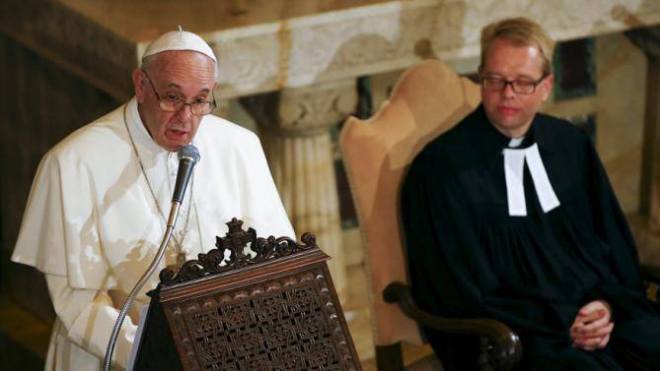I really shouldn’t be surprised anymore, but I was nonetheless yesterday.
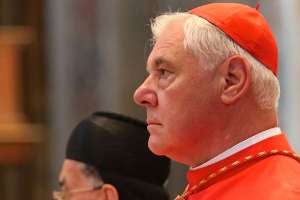 On Friday, Cardinal Gerhard Müller, former prefect of the Congregation for the Doctrine of the Faith and now a sort of free-roaming cardinal with no specific mission, issued a “Manifesto of Faith“. As he explains in the opening paragraphs he did so on the request of various people, both clergy and laity, in order to provide some measure of clarity to the confusion that exists about Catholic doctrine. Without doubt, we must understand this to be based in the different interpretations of recent papal teachings regarding such varied topics like marriage, sexuality and ecumenism. The teachings themselves may not be confusing, but their communication and interpretation most definitely are. But Cardinal Müller’s reasons go beyond this, and back over past decades and the formation, or lack thereof, of the faithful on matters of conscience, the nature of Christ, the Church, the sacraments, morality and eternal life.
On Friday, Cardinal Gerhard Müller, former prefect of the Congregation for the Doctrine of the Faith and now a sort of free-roaming cardinal with no specific mission, issued a “Manifesto of Faith“. As he explains in the opening paragraphs he did so on the request of various people, both clergy and laity, in order to provide some measure of clarity to the confusion that exists about Catholic doctrine. Without doubt, we must understand this to be based in the different interpretations of recent papal teachings regarding such varied topics like marriage, sexuality and ecumenism. The teachings themselves may not be confusing, but their communication and interpretation most definitely are. But Cardinal Müller’s reasons go beyond this, and back over past decades and the formation, or lack thereof, of the faithful on matters of conscience, the nature of Christ, the Church, the sacraments, morality and eternal life.
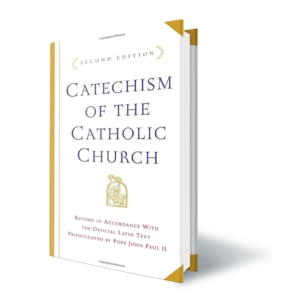 The manifesto is in the first place a summary of the Catechism of the Catholic Church, at least regarding the topics discussed. It is stuffed with references to paragraphs from the document, which aims to summarise the faith, and as such can serve as a helpful reminder of what it is that we confess as Catholics and how that affects our spiritual and daily life. Cardinal Müller also offers a few interpretations and explanations, which are all the interpretations of Tradition, communicated over the years and centuries by popes and theologians alike. Until those interpretations, for example that divorced and civilly remarried faithful can not receive Communion, are changed, they stand. They are what we are beholden to as Catholics. And, despite footnotes and desires expressed in interviews, under Pope Francis no steps have yet been taken to change this.
The manifesto is in the first place a summary of the Catechism of the Catholic Church, at least regarding the topics discussed. It is stuffed with references to paragraphs from the document, which aims to summarise the faith, and as such can serve as a helpful reminder of what it is that we confess as Catholics and how that affects our spiritual and daily life. Cardinal Müller also offers a few interpretations and explanations, which are all the interpretations of Tradition, communicated over the years and centuries by popes and theologians alike. Until those interpretations, for example that divorced and civilly remarried faithful can not receive Communion, are changed, they stand. They are what we are beholden to as Catholics. And, despite footnotes and desires expressed in interviews, under Pope Francis no steps have yet been taken to change this.
On to my surprise.
The reception of Cardinal Müller’s manifesto, especially in social media, has been as expected. Some quietly welcomed it, presenting it as a text worth reading, without, I must say, a lot of further comment. Others, however, including a significant number of Vatican commentators and reporters, have taken the text to frame the cardinal and his supporters:
Cardinal Müller, they say, is opposed to Pope Francis, and with this manifesto he presents an alternative Magisterium. Some have gone so far as calling him an anti-pope. How on earth, I wonder, can a text so rooted in the Catechism, in the faith that we all claim to confess as Catholics, be an alternative Magisterium? It is as if the critics claim that this is not the faith they confess, and, worse, not the faith that the pope confesses. If that were true, we would indeed have an anti-pope, but it would not be Cardinal Müller.
The criticism they level at Cardinal Müller is also marked not by theological refutations, but limit themselves to superficialities. The cardinal is angry at the pope for being dismissed as prefect of the Congregation for the Doctrine of the Faith, they say. We know this because of the way he signed his manifesto. He must be opposed to Pope Francis, because the Holy Father chooses not to discuss doctrine that much, instead focusing on social and charitable issues. Thus, they insist, the manifesto should not be taken seriously, even mocked (and not just the text, but in the first place its author).
Worst of all, those critics continue to insist that there is no confusion. There is therefore no other reason for Cardinal Müller to publish his manifesto than to position himself as an alternative authority to the pope. In reality, though, the different interpretations of various recent papal communications, and the spiritual and formative developments of the faithful over the past decades, are clear as day.
In the minds of Cardinal Müller’s attackers, a cardinal’s duty is to quietly fall in line with what the pope says and does. Their mission is not that of a shepherd, but of a sheep. Any hint at them overstepping that role is seen as an attack against them and what they consider the “fluffiest pope ever”, to borrow a phrase. This is an unhealthy attitude that changes the nature of the Magisterium and the hierarchy of the Church into a dictatorship. Some say that’s due to Pope Francis, but it’s his supposed self-appointed supporters who do the most damage.
The manifesto is text worth reading. As I’ve said above, it offers a reminder of what our faith actually entails in various matters. It says little about practical applications, but theologically it is a reminder of the rich foundation and intricate beauty of our faith. The manifesto is also a call to action, to rediscover that foundation and beauty, and grow beyond the earthly superficialities, which have their place and value, but which do not define our faith and unity with Jesus Christ.
The English text of Cardinal Müller’s manifesto is available in several places, such as here, while my Dutch translation can be found via this link.
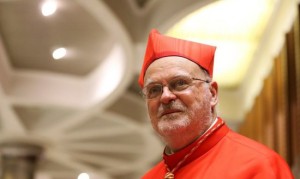 “It surprises me that the topic hasn’t been discussed that much. In Sweden, we have many mixed marriages. But most Catholics aren’t married to practicing Protestants. It is not an issue for us. Of course there are evangelical Christians who would like to receive Communion, but most are non-religious.
“It surprises me that the topic hasn’t been discussed that much. In Sweden, we have many mixed marriages. But most Catholics aren’t married to practicing Protestants. It is not an issue for us. Of course there are evangelical Christians who would like to receive Communion, but most are non-religious.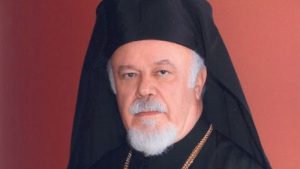 Greek-Orthodox Metropolitan Augoustinos, who hosted Cardinal Woelki in Bonn for the annual plenary meeting of the Greek-Orthodox Church in Germany, expressed himself in similar words after indicating that his church is also following the debate closely. He referred to the Orthodox principle of Oikonomia, which indicates that a regulation can be ignored or a rule broken when it serves the salvation of the person involved. But he then quoted Ecumenical Patriarch Bartholomew I, saying: “As soon as one defines the conditions under which Oikonomia can be applied, Oikonomia itself becomes a rule or regulation.”
Greek-Orthodox Metropolitan Augoustinos, who hosted Cardinal Woelki in Bonn for the annual plenary meeting of the Greek-Orthodox Church in Germany, expressed himself in similar words after indicating that his church is also following the debate closely. He referred to the Orthodox principle of Oikonomia, which indicates that a regulation can be ignored or a rule broken when it serves the salvation of the person involved. But he then quoted Ecumenical Patriarch Bartholomew I, saying: “As soon as one defines the conditions under which Oikonomia can be applied, Oikonomia itself becomes a rule or regulation.”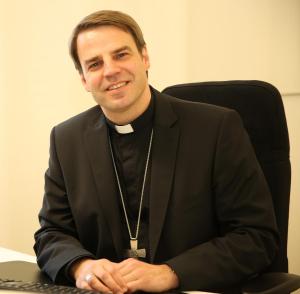 “It is right that we do not turn anyone away from the Communion bench. At that moment no judgement can be made about the discernment of conscience of the individual receiving. I can’t ‘expose’ anyone then. But when we take our understanding of the Eucharist seriously, there can be no superficial practice of giving Communion to just anyone. Therefore, as the priest giving Communion, I am obliged to offer people, at a suitable occasion, personal and spiritual guidance – and explain our understanding of the Eucharist more deeply. And yes, the praxis of individual pastoral care can indeed lead to singular and temporary situations. But in my opinion an official regulation of such exceptions can make it even more likely for such exceptions to become the rule. The current debate already shows that. It is basically less about the “serious spiritual need of individuals,” and more about the interdenominational marriages in general.”
“It is right that we do not turn anyone away from the Communion bench. At that moment no judgement can be made about the discernment of conscience of the individual receiving. I can’t ‘expose’ anyone then. But when we take our understanding of the Eucharist seriously, there can be no superficial practice of giving Communion to just anyone. Therefore, as the priest giving Communion, I am obliged to offer people, at a suitable occasion, personal and spiritual guidance – and explain our understanding of the Eucharist more deeply. And yes, the praxis of individual pastoral care can indeed lead to singular and temporary situations. But in my opinion an official regulation of such exceptions can make it even more likely for such exceptions to become the rule. The current debate already shows that. It is basically less about the “serious spiritual need of individuals,” and more about the interdenominational marriages in general.” Words from Pope Francis, in
Words from Pope Francis, in  This quote is especially interesting as
This quote is especially interesting as 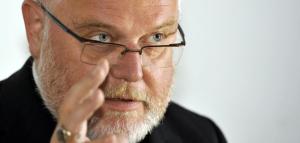 Cardinal Reinhard Marx, president of the German Bishops’ Conference and one of the supporters of the pastoral outreach,
Cardinal Reinhard Marx, president of the German Bishops’ Conference and one of the supporters of the pastoral outreach, 
 “We are celebrating Christmas in a tense time. The Middle East is on fire. North Korea and American are threatening “fire and fury” upon each other. Almost all countries are rearming themselves. Each one, in their own opinion, to defend themselves against the others. That is how the First World War started. How do we break this spiral of fear, hate and violence?
“We are celebrating Christmas in a tense time. The Middle East is on fire. North Korea and American are threatening “fire and fury” upon each other. Almost all countries are rearming themselves. Each one, in their own opinion, to defend themselves against the others. That is how the First World War started. How do we break this spiral of fear, hate and violence? Last week, Bishop Gerard de Korte wrote
Last week, Bishop Gerard de Korte wrote  “Brothers and sisters,
“Brothers and sisters, Bishop Jan Liesen responds to the news of the passing of Bishop Hubertus Cornelis Antonius Ernst, emeritus bishop of Breda, six weeks after celebrating his 100th birthday. The most senior of the Dutch bishops passed away late in the evening on Friday 19 May.
Bishop Jan Liesen responds to the news of the passing of Bishop Hubertus Cornelis Antonius Ernst, emeritus bishop of Breda, six weeks after celebrating his 100th birthday. The most senior of the Dutch bishops passed away late in the evening on Friday 19 May.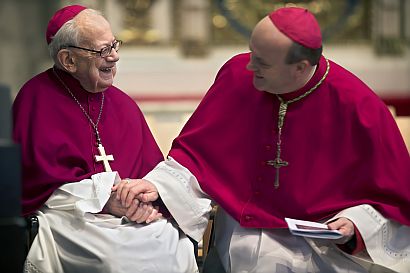 “Into very old age Bishop Huub Ernst was vital and concerned with his diocese, the Church province and society as a whole. He was consecrated as a bishop almost fifty years ago. Recently, we were able to congratulate him with his 100th birthday. Bishop Ernst was our older brother in the office of bishop, possessing a great heart for charity and the work of peace.”
“Into very old age Bishop Huub Ernst was vital and concerned with his diocese, the Church province and society as a whole. He was consecrated as a bishop almost fifty years ago. Recently, we were able to congratulate him with his 100th birthday. Bishop Ernst was our older brother in the office of bishop, possessing a great heart for charity and the work of peace.”
 Bishop Gerard de Korte, bishop-elect of ‘s-Hertogenbosch and Apostolic Administrator of Groningen-Leeuwarden: “As far as I can see the Pope tries, in the first place, to be a pastoral teacher. … In Amoris laetitia Francis pleads for an inclusive Church. The Pope does not want to build walls, but bridges. People who have failed in relationships are also a part of the Church and must be able to continue with their lives. Wise pastors can, in the privacy of pastoral encounter, support failing people and help them, so that they can continue with the journey of their lives. It is about continuous dialogue with people who, even when they have fallen short, are and remain God’s creatures.”
Bishop Gerard de Korte, bishop-elect of ‘s-Hertogenbosch and Apostolic Administrator of Groningen-Leeuwarden: “As far as I can see the Pope tries, in the first place, to be a pastoral teacher. … In Amoris laetitia Francis pleads for an inclusive Church. The Pope does not want to build walls, but bridges. People who have failed in relationships are also a part of the Church and must be able to continue with their lives. Wise pastors can, in the privacy of pastoral encounter, support failing people and help them, so that they can continue with the journey of their lives. It is about continuous dialogue with people who, even when they have fallen short, are and remain God’s creatures.” Bishop Jan Hendriks, Auxiliary Bishop of Haarlem-Amsterdam: “The Exhortation has a very strong pastoral spirit. The text breathes understanding and love for all people. Nothing is being rationalised or denied, no new doors are opened that were closed, but throughout the entire document there is a warm, ‘inclusive’ spirit: you belong, even when the situation you are in is not perfect. Besides, we are all people “on our way”. Developing what’s good and involving people where possible is the starting point of the ‘divine pedagogy’ that the document intends to promote. Teaching remains teaching, but what matters here is the approach of people and that is open, warm and pastoral.”
Bishop Jan Hendriks, Auxiliary Bishop of Haarlem-Amsterdam: “The Exhortation has a very strong pastoral spirit. The text breathes understanding and love for all people. Nothing is being rationalised or denied, no new doors are opened that were closed, but throughout the entire document there is a warm, ‘inclusive’ spirit: you belong, even when the situation you are in is not perfect. Besides, we are all people “on our way”. Developing what’s good and involving people where possible is the starting point of the ‘divine pedagogy’ that the document intends to promote. Teaching remains teaching, but what matters here is the approach of people and that is open, warm and pastoral.” Archbishop Stefan Heße, Archbishop of Hamburg: “The Pope is aware of the realities of life of the people of today. In the past decades this reality has changed more than in the centuries before. On the other hand, Francis makes clear: we do not reject our ideals. But we must consider anew how people can live according to them. We must succeed in building a stable bridge between ideal and reality. The Pope consciously made no new regulations. He rather wants to provide the means to promote the formation of people’s conscience.”
Archbishop Stefan Heße, Archbishop of Hamburg: “The Pope is aware of the realities of life of the people of today. In the past decades this reality has changed more than in the centuries before. On the other hand, Francis makes clear: we do not reject our ideals. But we must consider anew how people can live according to them. We must succeed in building a stable bridge between ideal and reality. The Pope consciously made no new regulations. He rather wants to provide the means to promote the formation of people’s conscience.” Archbishop Heiner Koch, Archbishop of Berlin: “I see this text as a great invitation to the local Churches, to commit ourselves even more to marriage and family, in marriage preparation, the guidance of married couples, but also in the attention to remarried divorcees and single parents. … Pope Francis rejects any “cold bureaurcratic morality” and describes all pastoral care as “merciful love”, which is “ever ready to understand, forgive, accompany, hope, and above all integrate” (n. 312).
Archbishop Heiner Koch, Archbishop of Berlin: “I see this text as a great invitation to the local Churches, to commit ourselves even more to marriage and family, in marriage preparation, the guidance of married couples, but also in the attention to remarried divorcees and single parents. … Pope Francis rejects any “cold bureaurcratic morality” and describes all pastoral care as “merciful love”, which is “ever ready to understand, forgive, accompany, hope, and above all integrate” (n. 312). Msgr. Andreas Kutschke, Diocesan Administrator of Dresden-Meißen: “The text reminds us that the loving God cares for every person and wants him to grow towards Him. That is our good news to the whole of society. The actions of the Church regarding marriage and family must always direct themselves to that. The challenges of the Gospel should not be concealed, but addressed in a timely and comprehensible manner. That is the tone of this multilayered text.”
Msgr. Andreas Kutschke, Diocesan Administrator of Dresden-Meißen: “The text reminds us that the loving God cares for every person and wants him to grow towards Him. That is our good news to the whole of society. The actions of the Church regarding marriage and family must always direct themselves to that. The challenges of the Gospel should not be concealed, but addressed in a timely and comprehensible manner. That is the tone of this multilayered text.” Archbishop Ludwig Schick, Archbishop of Bamberg: “The Pope shows himself a realist in Amoris laetitia. He knows that marriage and family need special attention in Church and society today, so that they can really be lasting communities of love. That is why, in addition to the fundamental statements, based on the Bible and the Tradition of the Church, about the beauty, richness, value and necessity of marriage, it is important for the Pope that marriage preparation and the guidance of families gets a closer look. State and society, employers, associations and individuals are encouraged to support marriage and family more and give them the necessary assistance.”
Archbishop Ludwig Schick, Archbishop of Bamberg: “The Pope shows himself a realist in Amoris laetitia. He knows that marriage and family need special attention in Church and society today, so that they can really be lasting communities of love. That is why, in addition to the fundamental statements, based on the Bible and the Tradition of the Church, about the beauty, richness, value and necessity of marriage, it is important for the Pope that marriage preparation and the guidance of families gets a closer look. State and society, employers, associations and individuals are encouraged to support marriage and family more and give them the necessary assistance.” Bishop Luc Van Looy, Bishop of Ghent: “Amoris laetitia is in the first place a pastoral and not a doctrinal document. This means that it departs from reality as it exists in all its complexity and diversity. That reality is listened to, and not in the first place condemned. The good that is present must be promoted and given the chance to grow. A pastoral approach means: walking together (synodal) in joy (laetitia), but also in difficult times and crises that people go through in relationships and the raising of children. This must happen with sensitivity, with a lot of respect, tactfully and patiently, in dialogue and without preconceptions. Secondly, this pastoral approach is an inclusive approach. This means that no one is excluded. That is the baseline, if you will, of the entire document, which can be summarised in the key words in the title of the important eighth chapter: Accompanying, discerning and integrating. The Church must do all to let people, in whatever situation they find themselves, be part of the community. That returns like a refrain.”
Bishop Luc Van Looy, Bishop of Ghent: “Amoris laetitia is in the first place a pastoral and not a doctrinal document. This means that it departs from reality as it exists in all its complexity and diversity. That reality is listened to, and not in the first place condemned. The good that is present must be promoted and given the chance to grow. A pastoral approach means: walking together (synodal) in joy (laetitia), but also in difficult times and crises that people go through in relationships and the raising of children. This must happen with sensitivity, with a lot of respect, tactfully and patiently, in dialogue and without preconceptions. Secondly, this pastoral approach is an inclusive approach. This means that no one is excluded. That is the baseline, if you will, of the entire document, which can be summarised in the key words in the title of the important eighth chapter: Accompanying, discerning and integrating. The Church must do all to let people, in whatever situation they find themselves, be part of the community. That returns like a refrain.” Bishop Rudolf Voderholzer, Bishop of Regensburg: “Amoris laetitia is an attractive and inviting text, a hymn on God-given love. It contains neither generalisations nor blanket solutions. I hope very much that chapters two and three, which recall in a new and fresh way the Biblical and doctrinal basis of conjugal love, will be read and internalised. Of course the Holy Father especially takes those situations into account, in which people are threatening to fail or have failed to achieve the ideal. It is the wish of the Church, the Pope says, “to help each family to discover the best way to overcome any obstacles it encounters” (AL 200).”
Bishop Rudolf Voderholzer, Bishop of Regensburg: “Amoris laetitia is an attractive and inviting text, a hymn on God-given love. It contains neither generalisations nor blanket solutions. I hope very much that chapters two and three, which recall in a new and fresh way the Biblical and doctrinal basis of conjugal love, will be read and internalised. Of course the Holy Father especially takes those situations into account, in which people are threatening to fail or have failed to achieve the ideal. It is the wish of the Church, the Pope says, “to help each family to discover the best way to overcome any obstacles it encounters” (AL 200).” Bishop Frans Wiertz, Bishop of Roermond: “In his text, the Pope wants to emphasise mercy. Although nothing changes in the ideal of marriages and the rules surrounding receiving the sacraments, the Pope invites everyone in the Church to find ways in which no one will have to feel excluded. These words of the Pope are important for many Catholics, as they want to clarify that the ideal of a good life can always only be achieved via a way which knows imperfections in reality. Although no one can afford to accept broken or unwanted situations, at the same no one is excluded or treated second-rate because of the situation in which they find themselves.”
Bishop Frans Wiertz, Bishop of Roermond: “In his text, the Pope wants to emphasise mercy. Although nothing changes in the ideal of marriages and the rules surrounding receiving the sacraments, the Pope invites everyone in the Church to find ways in which no one will have to feel excluded. These words of the Pope are important for many Catholics, as they want to clarify that the ideal of a good life can always only be achieved via a way which knows imperfections in reality. Although no one can afford to accept broken or unwanted situations, at the same no one is excluded or treated second-rate because of the situation in which they find themselves.” Rainer Maria Cardinal Woelki, Archbishop of Cologne: “It is above all important for Pope Francis that the Church is close to people, that she avoids every appearance of idealistic exagerration, indifferentiated judgement, loveless condemnation or even exclusion. This attitude of closeness, a “humble realism” and mercy remains in tension with the fact that the Church is always ‘Mater et Magistra’, mother and teacher, which does not witthold the people anything that the Creator has wanted in Creation and taught through Christ.”
Rainer Maria Cardinal Woelki, Archbishop of Cologne: “It is above all important for Pope Francis that the Church is close to people, that she avoids every appearance of idealistic exagerration, indifferentiated judgement, loveless condemnation or even exclusion. This attitude of closeness, a “humble realism” and mercy remains in tension with the fact that the Church is always ‘Mater et Magistra’, mother and teacher, which does not witthold the people anything that the Creator has wanted in Creation and taught through Christ.” Bishop Konrad Zdarsa, Bishop of Augsburg: “In the introduction, the Holy Father recommends not to read it hastily. That is why I will not be commenting in haste. Read those sections that are important to you in your situation, relate to them in all peace in your family, consider them also carefully in your parish communities and pastoral councils.”
Bishop Konrad Zdarsa, Bishop of Augsburg: “In the introduction, the Holy Father recommends not to read it hastily. That is why I will not be commenting in haste. Read those sections that are important to you in your situation, relate to them in all peace in your family, consider them also carefully in your parish communities and pastoral councils.”